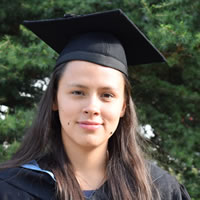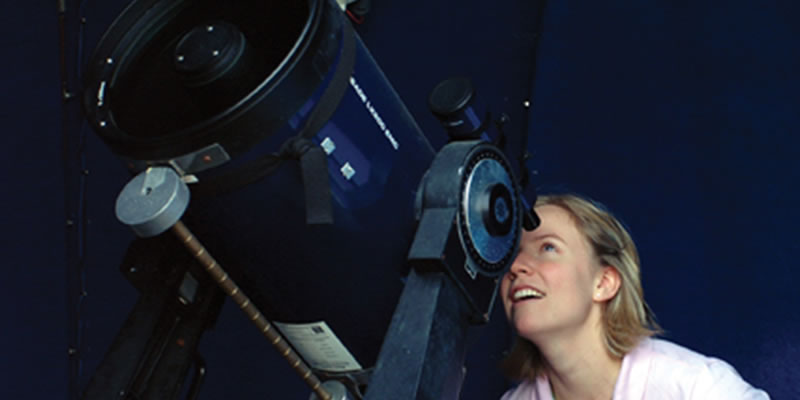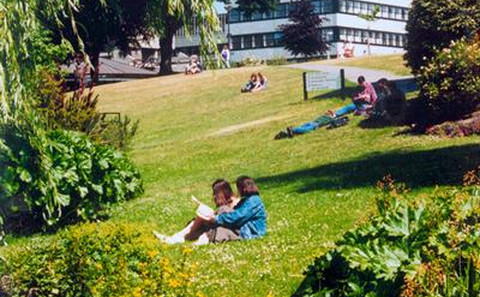This degree combines our robust physics and astronomy training with an unrivalled opportunity to gain advanced-level research experience in the field of astrophysics. While astronomy encompasses space observation and data gathering, astrophysics focuses on modelling and interpreting space data to gain a deeper insight into astronomical phenomena. That’s exactly what you’ll do if you are selected for the year abroad at the Harvard-Smithsonian Center for Astrophysics.
Academics at the Center offer a wide range of research projects, so there’s plenty of scope to find a topic that inspires you. Past projects have investigated:
- ways to determine the mass of galaxy clusters
- methods to improve near-Earth asteroid discovery
- star formation in the extreme environment of the galactic bar
- the growth of supermassive black holes
- models to assess the effect of space weather on the habitability of planets
It’s an exceptional opportunity to get a flavour of research at PhD level. For example, you’ll have the chance to present a poster at a meeting of the American Astronomical Society – an international conference that attracts around 2,000 astronomers. Often our students’ work is published in scientific journals.
Your year abroad will be challenging – you’ll be expected to adapt quickly to working at the level of the postgraduates in your research team. However, there’s plenty of support in place, both at Southampton and from Harvard staff, to help you make the transition and to provide any help you need throughout your study-abroad year. We’ll also support you with the practical and financial aspects of moving overseas.
View the 2019/20 programme specification document for this course
View the 2020/21 programme specification document for this course
Research-grade astronomy facilities
In your first three years you’ll use state-of-the-art equipment in our teaching laboratories, with guidance from expert technicians who are there to support your experimental work. You’ll also benefit from our recently refurbished Physics and Astronomy foyer, with a specialist library and dedicated study spaces.
Our superb astronomy facilities couldn’t be closer to hand – there is an observatory on the roof of the Physics and Astronomy building, equipped with two high-spec telescopes and CCD detectors for astronomy imaging.
During your year abroad you’ll have access to the Harvard-Smithsonian’s research facilities, including supercomputers and a huge archive of space data.
A top-five research department
Study with us and you’ll join one of the top five Russell Group departments for physics and astronomy research (REF 2014). Our research reputation is built on a track record of discovery and we remain on the frontline of new developments. For example, Southampton physicists were instrumental in the development of erbium doped amplifiers – an essential part of today’s internet infrastructure – and more recently our scientists were involved in detecting gravitational waves and light from the collision of two neutron stars for the first time.
You’ll hear about the latest research findings, often before they are published or reported in the media, from lecturers who are directly involved in outstanding research. Our Astronomy Research Group is a hub for highly respected research in specialist areas including the evolution of compact objects and the space environment. Two of our astronomy staff are Royal Society Fellows, a prestigious award that demonstrates research of the highest calibre.
Accreditation
Our MPhys Physics programmes are accredited by the Institute of Physics
Programme Structure
Our top MPhys Physics with Astronomy students can switch to the flagship degree at the end of year two. The third year is then carefully coordinated to cover all the core physics and astronomy modules, freeing you up to spend the whole of year four on your research project.
An introductory astronomy module in year one lays the foundation for specialised studies in later years, when you’ll gain a more in-depth understanding of topics including the make-up, dynamics and environment of galaxies, the space environment and space weather, and concepts of modern cosmology.
Your understanding of astronomy will be underpinned by your wider physics studies. Year one modules cover energy and matter, electromagnetism, special relativity and the foundational theories of quantum physics. You’ll gain more in-depth knowledge as you progress, applying your learning in areas such as particle and atomic physics. You’ll also develop the mathematical skills to model real-world problems and analyse data, and the practical skills to work confidently in the lab and design your own experiments.
To Apply
All undergraduate applications for Physics and Astronomy should be made online through the Universities and Colleges Admissions Service (UCAS).
Students interested in this degree should apply to F3FM MPhys Physics with Astronomy.
Find out how to apply and get further details about UCAS' website, phone and contact details.
Key Facts
Spend a year immersed in research at the Harvard-Smithsonian Center for Astrophysics
Work alongside Harvard researchers and get a flavour of research at PhD level
Two of our astronomy academics are Royal Society Fellows, a prestigious award which demonstrates research of the highest calibre


